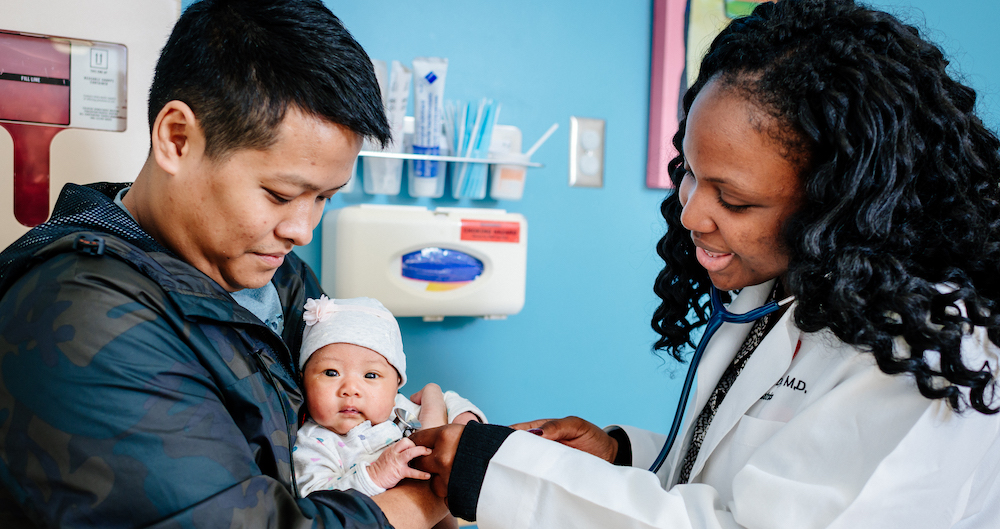
The purpose of the Comprehensive Urban Underserved and Rural Experience (CU2RE) Program is to increase the number and quality of students entering into primary care, with an emphasis on students interested in caring for under-resourced communities. The program is designed to develop students to enter primary care as leaders in their communities and profession.
Key Facets
-
Self
Successful graduates of the CU2RE program will develop as leaders and agents of change, with emphases on self-awareness, emotional intelligence, and management of inherent assumptions and biases.
-
Patients
Successful graduates of the CU2RE program will appreciate the holistic context of patients’ lives, including the experiential, societal, and psychosocial factors that affect their health and treatment. As a result, graduates will provide treatment within relationships that are based on understanding each patient’s unique set of circumstances related to their health.
-
Teams
Successful graduates of the CU2RE program will recognize the importance of other health professionals for meeting the needs of each patient, while being able to serve and lead within the context of a multidisciplinary treatment team.
-
Population Health
Successful graduates of the CU2RE program will understand the measures and outcomes that can be used to improve population health, particularly for the communities that they serve.
-
Healthcare Systems
Successful graduates of the CU2RE program will lead in the transformation of healthcare through the implementation of value-based care, innovative models of healthcare delivery, and the engagement of patients in healthy lifestyle behaviors.
Program Elements and Activities
-
Online Modules with Facilitated Class Discussions
Students will have access to online modules that are the core medical education elements for the program. Key aspects of each module will be discussed during monthly class discussion and reflection assignments. These modules and class discussions will be completed primarily in the MS1 and MS2 years.
-
Early and Longitudinal Clinical Experience in Primary Care
Students will be assigned to an attending physician preceptor, primary care clinic, and surrounding community that they will follow throughout their 4 years of medical school education. Work with the preceptor/clinic will follow this approximate schedule:
- Half day (approximately four hours) per month (8-10 times per year) in the MS1 and MS2 years
- Four-week Summer Urban Underserved Pathways Experience between MS1 and MS2 years
- Four-week Family Medicine Clerkship in MS3 year
- Four-week Ambulatory Acting Internship in Family Medicine in MS4 year
-
10-Patient Panel
Over the course of the first year, students will develop a 10-patient panel that they will follow for the course of their medical school training. This will be one of the most meaningful experiences during the course of your medical training.
The goal of the 10-patient panel is to develop personal relationships with a set of patients who represent varied points across the lifespan, understand common medical conditions that might occur throughout a patient’s life, and appreciate the concepts of disease prevention and population health.
-
Service Learning
Part of the program includes service learning (or learning service) that would likely occur within the community of the student’s continuity clinic.
-
Leadership & Professional Development Retreats
Students will participate in 1-2 retreats each year that will predominantly focus on personal and professional development (e.g., leadership training, addressing health care needs of those from a variety of backgrounds, advising for medical school and preparation for residency, etc.).
-
Primary Care Advisor
Each student will be paired with at least one primary care advisor who will guide the student through medical school, help prepare them for residency training, and offer assistance during career development as a primary care physician. Formal advising meetings will occur one to two times per year throughout the four years of medical school, but more informal meetings are also encouraged.
-
Scholarly Activity
Students will conduct a scholarly project under the guidance of research faculty. Projects may cover a range of topics including population health, social risk factors, the impact of telemedicine on primary care, and more.
This project will count toward your UABSOM scholarly activity requirement.
-
Leadership Development
In addition to periodic retreats, students will have access online modules and printed materials pertaining to leadership development. Students will also have the opportunity to work with a dedicated individual from the Office of Leadership and Professional Development within the department to establish an individually tailored development plan and/or receive leadership development coaching.
Applications for CU2RE are now open: First-year medical students can learn more and apply for the next cohort of the CU2RE program by completing this application.
The CU2RE Program is supported by the Health Resources and Services Administration (HRSA) of the U.S. Department of Health and Human Services (HHS) as part of an award totaling $16 million with 10% financed with non¬governmental sources. The contents are those of the author(s) and do not necessarily represent the official views of, nor an endorsement, by HRSA, HHS, or the U.S. Government.